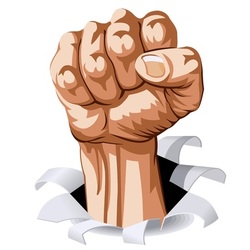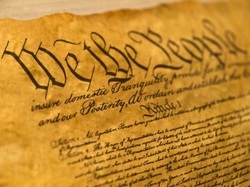
I might point out that government's always been out of control -- not just ours, but the entire concept of some people governing over others, mainly because people who cannot even fix themselves (all of us) are trying to fix everyone. They're dealing with far more complex systems than themselves as individuals, and the decision process is far more complex because it's made by multiple people with conflicting interests and conflicting ideas about the world.
In a monarchy, at least you might have a little consistency of decisions -- if the leader were rational. But of course in the States we ran from that model because you might have the benefit of a wise and beneficent leader but, if history told us much, it told us that lucking out with such a leader was pretty much a fat chance. So we preferred to have squabbling that didn't accomplish a lot.
So government's broken because of people who are greedy and corrupt, but also because of people who are well-intentioned yet who cannot possibly predict the results of their decisions, much less track them in a sea of other factors, like global economies, other laws, people's individual decisions, or butterflies flapping their wings.
 What the hell is this thing???
What the hell is this thing??? Too bad those haven't been read much. But had they been included in the Constitution, they probably wouldn't have been read anyway.
All this said, if we're talking about revolutions, I suppose my stance is that revolution is ongoing but that, thanks to technology, we're experiencing a hastened revolution right now. No, we haven't taken up arms, but in many ways, we're taking up action. Figuring that government is no longer attempting to protect the people, but to control them, masses of people are starting to secure the internet from the grassroots to avoid mass surveillance by the NSA. Figuring that the government has already sold its economy to the private banking system, people have begun developing a digital economy that attempts to bypass central control.
Technology that empowers individuals will continue giving us grassroots ways to separate ourselves from central control, but of course no center of power wants to lose its power, and we may well see a grasping for control the way we see the death throes of industries that fail to adapt to a changing world.
However, that point tells us that governments could adapt if they want to. No saying how long Barnes & Noble will survive, for instance; but they have attempted to stay alive but making some changes, like having a Nook that competes with the Kindle and provides bonuses to people who visit brick & mortar stores. I don't know that they're adapting quickly enough -- they have to give people other reasons to visit their stores. I'm thinking things like "Print on Demand" machines that let people print all sorts of books on the spot, whether they're in inventory when they walk into the store or not.
But I digress. The point is that governments can adapt with the times as well. They are, after all, in theory supposed to be managers that prevent people from hurting one another and that organize the collective investments in infrastructure, defense, etc. If they will do their job correctly and actually look out for the people, then -- again, in theory -- they could have a meaningful place in society, not micromanaging our lives, but guiding us collectively toward the best of what humanity has to offer.
I don't call this an easy job, but that's why they're paid the big bucks and get to opt out of broken health care systems. Darwood & Smitty, I think, observes some of the challenges of government. But in one way it also shows us a kind of final revolution -- what's really needed to throw off the shackles. But I'll leave that for the novel to tell.
 RSS Feed
RSS Feed